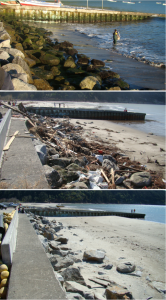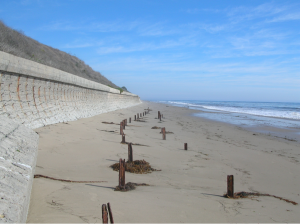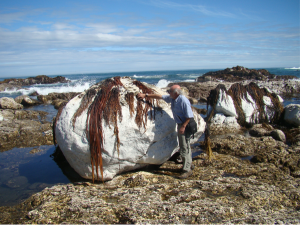Sometimes, part of being a scientist is dealing with the unexpected. During research projects, scientists might get very surprising results. Or, something might happen to completely change the scope of the project. This is exactly what happened to a group of scientists in Chile. Scientists were studying how man-made armoring, such as seawalls, impact the ecology of beaches in Chile and California. They had surveyed 9 beaches in Chile when something very unexpected happened on 27 February 2010– an 8.8 magnitude earthquake hit.
Rather than be discouraged at the change in their project, the scientists realized what a unique opportunity they had to study the effects of an earthquake on the beaches of Chile. The scientists altered their study to instead look at the recovery of the marine plants and animals and the long-term effects of the earthquake on the beaches. It may not be obvious, but conducting scientific research requires you to be flexible. While you might have a well thought out theory or hypothesis, as you work through your investigation, new data or changes in the study environment will require you to go back and reassess your strategy. This is the scientific method in action and more often than not, leads to stronger research conclusions.
Before the earthquake, the scientists had learned that seawalls and other types of armoring actually lead to smaller beaches and less diversity of plants and animals living at the beaches. A seawall covers up parts of the beach habitat and over time, more and more sand is lost. Eventually, the beach will drown, or become nonexistent.
After the earthquake, the scientists realized that some of the beaches that were drowning before the earthquake were now being restored. Sometimes during earthquakes, there can be an uplift of material (like sand or rocks), which is what happened to some of the beaches in Chile. They also found that many of the marine animals that were gone from the location for years before the earthquake were moving back into the newly restored beaches within a few weeks.
This team of scientists embraced the unexpected and ended up finding some very important results!
Have you found something unexpected while doing GLOBE protocols? Or has something unexpected happened while you were doing an investigation? Send us an email at science@globe.gov or add a comment to let us know!
-Julie Malmberg




I am stunned to see large uplifted ROCKS on a beach.
Is there any news saying whether or not the rocks have been moved?
Great question, Hugh! I did some research and it looks like this area is being kept untouched to see what happens to a beach after an earthquake. So, I imagine the big rocks are still there, unless moved by the ocean itself. I emailed one of the scientists on this project to see how the beaches look now and will report back when I hear anything!
-Julie
I did some research and it looks like this area is being kept untouched to see what happens to a beach after an earthquake.